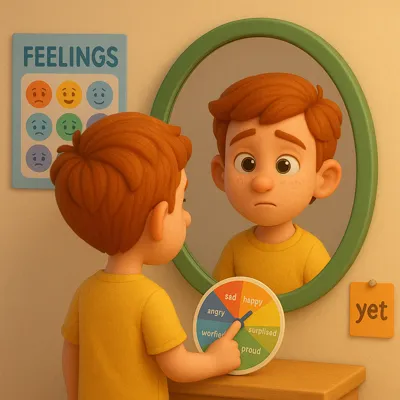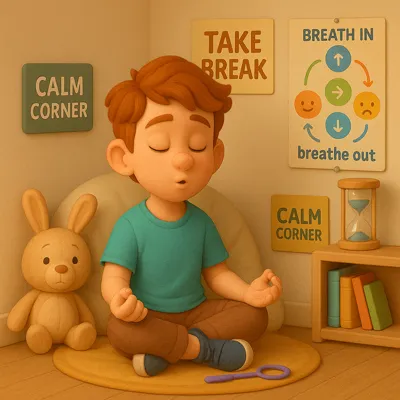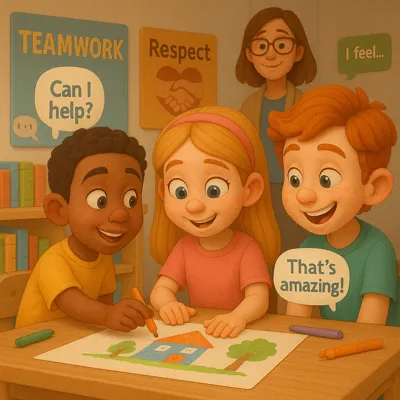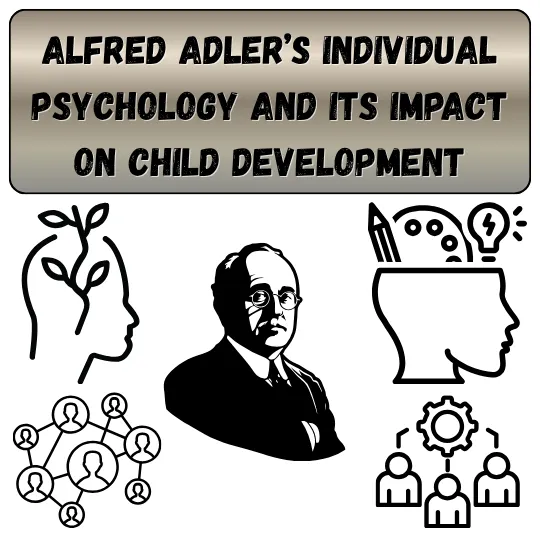What is Social Emotional Learning (SEL)?
Social Emotional Learning, or SEL as it is often abbreviated, is the process of developing the skills that are needed in children for them to be able to:
- manage their emotions,
- build healthy relationships,
- make responsible decisions, and,
- manage challenges that life throws their way.
Why is SEL Important for Children's Development?
Social-Emotional Learning (SEL) plays a vital role in shaping a child's overall development. It equips children with essential life skills—such as managing emotions, building positive relationships, and making responsible choices—that contribute to both academic success and personal well-being. Research shows that children who develop strong social and emotional skills are more likely to experience positive mental health, demonstrate resilience in the face of challenges, and engage more effectively in learning. Embedding SEL into everyday interactions helps create a supportive environment where children can thrive both in school and beyond.
SEL has five core competencies that must be developed before children can achieve personal growth, academic achievement, and social engagement. These competencies are detailed below and include:
SEL Competency: Self-Awareness

Self-awareness is the ability to recognise how your emotions, thoughts, values and beliefs influence your behaviour.
Children with the following essential skills will have higher levels of self-awareness:
- Can recognise and label their emotions.
- Can recognise physical sensations and link them to emotions.
- Ability to be self-reflective.
- Awareness of personal strengths and weaknesses.
- Awareness of personal values and beliefs.
- Awareness of situations or experiences that can be an emotional trigger.
- Have a growth mindset.
- Can see things from others’ perspectives.
Developing self-awareness in children can promote their emotional intelligence and personal growth. Some activities that can promote self-awareness in children include:
- Using emotion charts or wheels to help children label emotions and feelings.
- Role-playing scenarios where alternative endings can be performed.
- Holding conversations based on ethics, moral dilemmas and different values.
- Using mindfulness activities and yoga to promote physical and emotional awareness.
- Using phrases such as “I cannot do this … yet!” to challenge fixed mindsets.
Read more about self-awareness in children.
SEL Competency: Self-Management

Self-management is the ability to regulate thoughts, emotions and behaviours in a wide range of different situations. Children who can control impulses, manage stress and motivate themselves to achieve goals will have a higher level of self-management.
Children with the following essential skills will have higher levels of self-management:
- Can control impulses.
- Can demonstrate delayed gratification.
- Can reflect on things that have happened.
- Can take the initiative and pursue tasks without the need for a reward.
- Are open-minded and adaptable to changes.
- Can persevere in the face of setbacks.
- Can self-soothe to manage stress and anxiety.
- Can set short- and long-term goals.
- Can self-regulate their emotions.
Self-management skills are crucial for academic success and emotional well-being. The following activities can help to develop self-management skills in children:
- Playing games that require waiting and turn-taking.
- Helping children to see the bigger reward rather than the instant reward.
- Role-playing scenarios to act out changes in routine and how to react to them.
- Providing opportunities to complete tasks independently.
- Praising effort (rather than outcomes).
- Using guided relaxation and meditation exercises.
- Teaching coping strategies such as counting to 10.
Read more about self-management in children.
SEL Competency: Social Awareness

Social awareness is about understanding and empathising with others. Social awareness also includes the ability to recognise social and ethical norms and understand the perspective of others.
Children who can demonstrate the following skills will have a higher level of social awareness:
- Can show empathy towards others.
- Knows their role within the community.
- Can resolve conflict peacefully.
- Demonstrates good active listening skills.
- Shows compassion and kindness to others.
- Recognises social cues and social norms.
- Understands and appreciates differences.
- Can see things from the view of others.
The following social awareness activities can help children to interact positively with others, respect differences and diversity and understand the importance of kindness and empathy:
- Role-playing scenarios to practice understanding the feelings of others.
- Holding conversations around thinking about how others might feel in different situations.
- Celebrating diversity through classroom activities.
- Playing games that practice social norms and appropriate behaviours.
- Encouraging random acts of kindness.
- Learning about civic responsibility.
- Role-playing conflict scenarios and practising negotiations.
SEL Competency: Relationship Skills

Relationship skills are essential for childhood and include establishing and maintaining healthy relationships with others.
Children with the following skills will have an easier time maintaining relationships:
- Demonstrates good active listening skills.
- Demonstrates clear and respectful language skills.
- Works well with others.
- Shows empathy towards others.
- Can see things from the view of others.
- Recognises social cues and social norms.
- Shows compassion and kindness to others.
- Can resolve conflict peacefully.
- Respect the boundaries of others.
- Can self-regulate their emotions.
Relationship skills can be developed in children by following some of these activities:
- Practicing conversations using the “I” statement to express feelings (“I feel ..”).
- Running group projects that require collaborative work.
- Role-playing conflict scenarios and practising negotiations.
- Role-playing scenarios to practice understanding the feelings of others.
- Teaching about personal space.
- Building things together, such as a puzzle.
- Teaching coping strategies such as counting to 10.
- Team building exercises.
SEL Competency: Responsible Decision-Making
Children who make responsible decisions can make constructive and respectful choices about personal behaviour and social interactions.
Children who can demonstrate the following skills will be able to make better choices:
- Thinking about potential outcomes before taking action.
- Can identify, think through and solve problems.
- Can think morally and ethically.
- Can manage impulses, behaviours and emotions.
- Can set personal goals for themselves.
- Show empathy towards others.
- Learn from their mistakes.
- Understand who their influences are.
- Can reflect on choices that they have made.
- Can think about how their decision might affect others.
The following list of activities can promote responsible decision-making in children:
- Using group discussions to discuss and debate solutions to problems.
- Role-playing scenarios where children predict what might happen next.
- Holding conversations around ethical and moral dilemmas.
- Using mindfulness techniques.
- Role-playing scenarios to practice understanding the feelings of others.
- Using open-ended questions to encourage critical thinking.
- Using journals to reflect upon actions.
- Holding discussions on how emotions, the environment and peers can influence our choices.
- Reflecting on mistakes and how we can improve on them next time.
The Importance of Social Emotional Learning
As you may have noticed, the five core competencies of Social Emotional Learning are deeply interconnected. Sometimes, one area cannot be fulfilled if skills in another area are absent. For instance, children who struggle to manage their emotions may find it challenging to achieve academic success as they may become overwhelmed. Similarly, children who have difficulty respecting the personal boundaries of others may struggle to maintain healthy relationships. Understanding these interconnections can provide a deeper insight into the holistic nature of SEL.
SEL is important because it helps develop a well-rounded child who can achieve academic success, have good mental health, and use social skills to build relationships, self-regulate, and self-soothe, reducing aggressive behaviours and outbursts.
Understanding SEL as a professional working with children will help you look beyond the initial presentation or behaviour and help the child develop healthy skills that will benefit them into adulthood.
Frequently Asked Questions about Social-Emotional Learning (SEL)
What age should SEL be introduced?
Social-Emotional Learning can be introduced from a very young age—even in early childhood settings. Simple activities that promote emotional awareness, empathy, and communication can begin in preschool and continue to build throughout primary and secondary education.
How does SEL support academic success?
When children can manage their emotions and build positive relationships, they are better equipped to focus, collaborate, and persevere through challenges. SEL has been linked to improved classroom behaviour, greater engagement, and higher academic achievement.
Can SEL help children with special educational needs (SEN)?
Yes. SEL provides valuable tools for children with SEN to develop emotional regulation, social communication, and problem-solving skills. Tailoring SEL approaches to individual needs can support inclusion and foster positive peer relationships.
Is SEL only taught in the classroom?
While schools play an important role, SEL is most effective when reinforced across multiple environments—at home, in community settings, and during everyday interactions. Parents, caregivers, and professionals all contribute to developing a child’s social-emotional skills.
How can I start teaching SEL at home?
You can encourage SEL at home by modelling healthy emotional expression, having open conversations about feelings, practising problem-solving together, promoting empathy, and praising efforts to manage emotions or build relationships.


